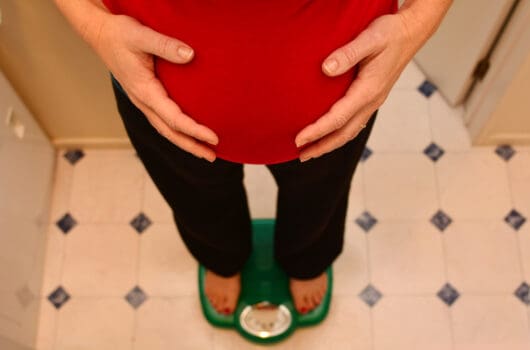For many women, the thrill of finding out they’re pregnant comes accompanied by the not-so-thrilling anticipation of weight gain, stretch marks, and morning sickness. But if you’ve found yourself stepping on the scale time and time again throughout your pregnancy, without the number shifting, you’ll recognize an unpleasant truth.
The horror of packing on a few pounds is nothing compared to the fear of why you’re not gaining any weight.
Did that baby inside of you decide it couldn’t be bothered to grow anymore? What if there isn’t a baby inside of you after all?
Fortunately, neither of these scenarios are likely. Although an absence of weight gain during pregnancy isn’t quite the norm, it’s not usually a huge cause for concern either, depending on a few factors related to your personal circumstances. Let’s run through what you should expect when you’re expecting.
How Much Weight Gain to Expect
Before we get into explaining why you might not be gaining weight during pregnancy and what you should be doing about it, it’s helpful to get one question straight.
Exactly how much weight gain during pregnancy is normal, anyway?
The caricature in many people’s minds of a woman who balloons in size often isn’t true to life. There’s no magic number here — all women and pregnancies are a little different. A few factors to account for are your BMI, how many babies you’re carrying, and the stage of pregnancy you’re at.
Different BMIs
The more overweight you are before falling pregnant, the less weight you need to gain throughout your pregnancy; the reverse is also true. There’s no perfect way of measuring exactly how much weight you need to gain, but considering that height and weight are the most important aspects to consider, body mass index (BMI) is the best metric we have.
Yes, if you have a lot of muscle, this number might be slightly off, in which case you might need to gain more weight than the recommendations tell you. But for most people, weight predictions based on BMI are (more or less) accurate.
So, head to a BMI calculator and plug in your weight and height. Based on the number it yields, you can work out exactly how much weight gain during pregnancy is average.
Here’s a breakdown based on the guidelines set by the American Pregnancy Association:
- BMI below 18.5: 28 to 40 pounds (12.7 to 18.1 kilograms)
- BMI between 18.5 and 24.9: 25 to 35 pounds (8.4 to 15.9 kilograms)
- BMI between 25 and 29.9: 15 to 25 pounds (6.8 to 11.34 kilograms)
- BMI above 30: 11 to 20 pounds (5 to 9.1 kilograms)
As you can see, the numbers decrease pretty sharply for higher BMIs.
But the problem with BMI as a measurement isn’t the only reason why these guidelines might not be 100% accurate — some people aren’t expecting one baby but two (or maybe even more). What then?
Expecting Twins?
You might think that, if you’re expecting two babies, you can expect to gain twice as much weight. Truth is, it doesn’t quite work like this.
Here are numbers closer to what you can expect, again set by the American Pregnancy Association:
- BMI between 18.5 and 24.9: 37 to 54 pounds (16.7 to 24.5 kilograms)
- BMI between 31 and 29.9: 31 to 50 pounds (14.1 to 22.7 kilograms)
- BMI above 30: 25 to 42 pounds (11.3 to 19.1 kilograms)
Unfortunately, there’s no guidance for underweight women (BMI under 18.5).
What about triplets, or even quadruplets? Again, the American Pregnancy Association doesn’t include any guidance, probably due to how unusual these types of pregnancies are. However, it’s reasonable to assume that your expected weight gain should increase by another few pounds (or kilograms) for each baby you’re carrying.
Different Stages in Pregnancy
Obviously, the amount of weight you should be gaining is highly dependent on the stage you’re at in your pregnancy. The numbers above outline the total weight gain you can expect throughout your pregnancy — but this isn’t particularly helpful if you’re in your first trimester and wondering if your current weight gain (or lack thereof) is normal.
A woman with a “normal” or “healthy” BMI can expect to gain between 1 and 4.5 pounds (0.5 to 2 kilograms) in the first trimester and 1 to 2 pounds (0.5 to 0.9 kilograms) every week during the second trimester and third trimester. Time to whip out the calculator and do the math.
Sadly, the American Pregnancy Association doesn’t provide this same guidance for underweight or overweight individuals. If that’s you, you can shave off or add on a few pounds based on where you stand for a rough idea, or speak with a medical professional for a more precise guide.
Why Weight Gain Matters
If you’re reading this, chances are you have a gut feeling that a lack of weight gain during pregnancy is a cause for concern and not celebration. But why exactly is it so important?
Basically, growing a whole human is hard work for the body. The average birth weight of a baby is around 7.5 pounds, which doesn’t come out of nowhere. The placenta alone should be a pound or two, the amniotic fluid and uterus typically weigh just as much, and then there’s the higher amount of breast tissue, blood volume, and maternal tissue to produce. Women should also gain more fat.
Without all this, it becomes less likely that a healthy baby will be born. But why exactly does this happen?
Reasons for Slow or No Weight Gain
By now, you should have a good idea of exactly how much weight gain is typical for a woman of your size — and why veering too far from that norm could be bad news for you and your baby. But if you’ve confirmed with yourself that you haven’t gained enough weight yet, you’re probably wondering why.
Although it’s always best to consult a doctor for the most accurate diagnosis, we’ll run through some of the most likely explanations.
Insufficient Calorie Intake

Simply enough, if you don’t eat enough calories when you’re pregnant, you’re not going to gain enough weight. Pretty intuitive, right? But a harder question is figuring out exactly how much you should be eating.
Contrary to popular belief, you don’t actually need to “eat for two” when you’re pregnant, but you certainly need to eat more than you would normally (except for the first trimester).
Once you’re into the second trimester, it’s recommended to up your food intake by around 300 to 350 calories a day, then again by 100 to 150 calories daily in the third trimester. This might sound like a lot, but it’s just a case of adding in an extra snack or two each day. There’s no need to go overboard!
Also, while treats are fine and can be part of a healthy diet, don’t use your pregnancy as an excuse to load yourself with too much junk food. Not eating the right things can be a key contributor to pregnancy complications, including (counterintuitively) difficulty gaining weight. We’ll give you some suggestions for nutrient-rich foods later.
For the most part, your body knows best — eat when you feel hungry and lay off the food when you’re not. But if you know you’re not getting close to the recommended calorie intake, it might be time to implement one of the weight gain strategies outlined below.
Nausea and Vomiting
Even if your calorie intake is perfect, you can’t expect to gain weight unless you actually retain all those calories. And if you’re throwing up every morning, that’s probably not going to happen.
If you find yourself with this dilemma, don’t panic — we’ve outlined some solutions to combat nausea and vomiting below.
Fast Metabolism
Similarly, a fast metabolism can prevent you from gaining weight, even if you’re eating more than the average pregnant woman with your BMI. This will make you the envy of every woman under normal circumstances, but it can certainly be concerning during pregnancy.
But don’t panic — it just means you might need to make more of a conscious effort to consume extra calories.
Food Aversions and Digestive Concerns
It’s not exactly a little-known fact that many women’s tastes change during pregnancy. We might start craving food we’ve never cared for before — or hating the food we’ve always loved.
Usually, this is a harmless quirk of pregnancy that can lead to some funny stories later down the road, but sometimes it can stop us from eating altogether. Almost nothing seems appetizing.
Again, this just means you’ll have to put some extra effort into what you eat.
What About Weight Loss?
You might think that losing weight during pregnancy is the sign of something awful and extreme happening, but it’s actually more normal than many people realize — as long as it happens early on in the pregnancy.
Since most women only gain a few pounds during the first trimester in the case of a perfect pregnancy, and this is also the time in pregnancy when many women start throwing up, the minimal expected weight gain during this period shouldn’t be that surprising.
However, once women lose more than 5-10% of their body weight, it’s more of a cause for concern.
Weight loss during the second or third trimester is also disconcerting. One rare condition related to weight loss is hyperemesis gravidarum, which looks like severe morning sickness and is accompanied by stomach pain and dehydration.
Although it could be the result of weight fluctuations related to water retention, it’s best to see a professional to err on the side of caution.
Consequences of Minimal Weight Gain
So, what happens when we fall victim to one of the issues outlined above?
Unfortunately, when pregnant women stay at a low weight, it increases their baby’s chance of being born prematurely, being born at a low weight, or experiencing a growth restriction in the uterus. There may also be complications after the child is born, such as issues with breastfeeding or missing milestones.
Don’t let this send you into a panic — but see it as an affirmation that you’re doing the right thing by researching the topic and taking action.
How to Increase Weight Gain
Fortunately, it’s not all doom and gloom. There are plenty of simple strategies you can implement to gain more weight without drastically changing your lifestyle.
If you love food, it’s good news, because many of these methods can be summarized in two words: eating more! However, it’s not quite that simple, so keep reading for the full take.
Combat Nausea
If the reason for your lack of weight gain is nausea, you’re in a tricky situation. The more you eat, the higher the risk of you throwing up — but when you throw up, you need to eat more to compensate for the calories lost. It’s a bit of a catch-22.
Your best shot at overcoming this issue is to tackle the nausea head-on. Staying hydrated and having little snacks regularly should make a huge difference. Also, eating ginger is a long-standing cure for nausea. It’s not just a fad, it works — some studies found it might actually be even more effective than medication.
Besides, there might be a light at the end of the tunnel. Morning sickness tends only to be an issue during the first trimester of pregnancy.
Take Note of Food Aversions
If your food aversions during pregnancy are ruining your appetite completely, try not to “power through” and ignore them. You’ll probably be better off listening to your body.
Instead, try to record the foods that you’ve developed an aversion to, and think up meals that don’t involve them. Many women find they’re averse to the same foods during pregnancy — garlic, spices, and onion, for instance.
Pay Attention to Nutrient Intake

When trying to gain weight, our first instinct might be to reach for the filthiest junk food you can find, but this isn’t the right approach. Ice cream might be delicious, and you can definitely have it sometimes, but it shouldn’t be the staple of your diet.
Check you’re getting the right vitamins and minerals for yourself and the body you’re growing inside you — if you’re not, that could explain why you’re experiencing complications.
If you’re really struggling to eat the right thing, you could even consider taking supplements. Pregnant women have unique needs, so make sure you look for supplements that cater to this, preferably prenatal vitamins.
Opt for Calorie-Dense Foods
Suggesting calorie-dense food might sound contradictory considering we’ve just advised you to choose nutritious foods. But McDonald’s meals and cookies aren’t the only foods that contain lots of calories.
Yes, you should stay away from the salad leaves and watermelon if you’re finding it hard to manage a higher food intake throughout the day, but there are plenty of calorific foods that are also healthy. Think avocadoes, nuts, seeds, legumes, and whole grains. Or why not drizzle some olive oil on your meals to add some extra energy?
Eat Little and Often
Alternatively, a hack that can help you trick your body into consuming more food is eating lots of little meals instead of a single large one. This way, you’ll only have to stomach a small amount of food at once.
For instance, instead of having a big pasta salad for lunch and lasagne for dinner, just opt for smaller meals like avocado toast, soup with bread, or yogurt with granola.
What to Do if You Can’t Gain More Weight
In most cases, the methods outlined above should do the trick, and you’ll see your weight increase in no time at all. But in some cases, they might not have the result you were hoping for. Is it time to see the doctor? Perhaps.
If you know you’re eating enough and there’s no clear explanation for your lack of weight gain (such as a fast metabolism or being very overweight) then it’s probably time to consult a professional — especially if you’re in your second or third trimester.
Keep Calm and Carry On
As you can see, the solution to gaining more weight during pregnancy isn’t necessarily “Eat more chocolate cake” — although sometimes that can work. Rather, it’s better to follow a careful and considered plan that involves consistently eating small amounts of healthy, nutrient-dense foods that you enjoy.
In a few weeks, when your baby is born and you’re sleeping two hours a night, you’ll be looking back wistfully at the days when the worst thing you had to worry about was not gaining weight during the early stages of pregnancy.
